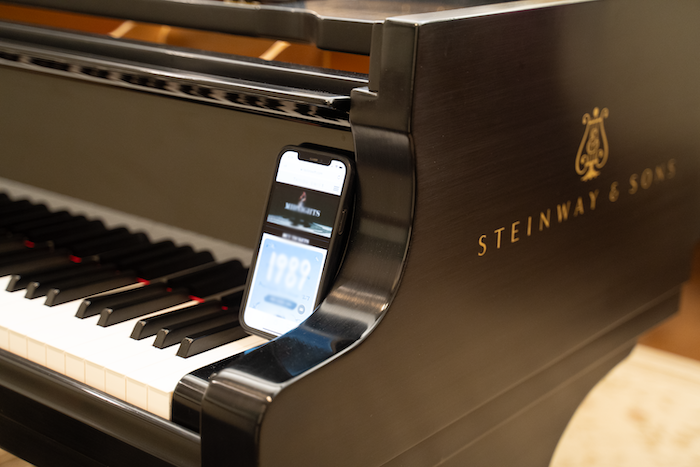Discipline in an age of distraction (part 1)
While smartphone use can have adverse mental-health effects, as discussed in a recent post about the pressures today’s music students face, personal devices are ubiquitous. At the Yale School of Music, students and faculty alike have designed individual strategies for remaining connected while focusing on the work of developing their craft. When used as a tool, a smartphone can be useful, for career development and as an escape, just as hand-held technology can be distracting.
For trumpeter Eric Evans ’24MM, the phone is an escape during moments of down time. Evan typically practices 45 minutes at a time, two or three times a day. During each session, he’ll play for 10 minutes and rest for five. That scheme protects his embouchure from overuse. During the breaks he takes, Evans will put down the horn, set a timer, and check Instagram, he says. When he does need to use those five-minute periods more productively, marking up a part, for example, that’ll take precedence.
Adjunct Associate Professor Albert Lee, who teaches in the School’s academic studies area, uses his device for all sorts of things. “I do a lot of work on my phone,” he says, explaining, “My approach is to put the phone down or away when I need to avoid distraction.”
There is no one-size-fits-all approach. For Evans, distraction isn’t a problem. Non-playing work, like writing an essay, can hold his attention for hours. The five-minute breaks he takes during practice sessions don’t leave any attention residue. “For me it’s like a switch,” he says. “I kind of learned how to do that, how to practice,” during his undergraduate years. Before that, he says, “I did have a tendency to get distracted, or over-focused.” For Evans, it’s about balance. He likens his practice scheme to athletic training, taking breaks between sets.
Some students are circumspect about the personal relationship they have with their devices. Soprano Laura Miah Ramos Salinas ’25MM admits, “I think I’m easily distracted.” In addition to distraction brought on by to-do lists and her internal monologue, Salinas says, “I feel like checking my phone is automatic. It’s so natural, now. I’ll miss 15 minutes of time I could’ve been practicing.” Counterintuitively, Salinas says “after being distracted for a while, focusing is almost easier.” But the screen time adds up. She receives notifications when she’s reached a certain threshold—three hours total for Instagram and YouTube—and describes the screen-time reports her phone provides as “crazy.”
“The point (of the screen-time notifications) is to sort of economize the amount of time you’re spending on social media,” Salinas says, admitting that she pays little attention to those notifications. “I’ll hit the mark every single day,” she says, and when the notification arrives, she says, “I ignore it.” That, despite her assessment that social media “is a hindrance to creativity.” She tells herself: The “dopamine release is something you could’ve gotten by doing something creative.”
Flutist Daniel Fletcher ’24MM is also aware of the encroachment of distraction. Echoing Salinas, he points out that many of us “wake up” from a scrolling session to find we haven’t done anything. To combat distraction, Fletcher says “I try to be really, really conscious of how much time I’m spending on [the phone].” And he deleted the Facebook app from his device. “If I didn’t feel like I have to, I wouldn’t be on [Facebook],” he says. The pressure, Fletcher says, comes from feeling the need to have a social-media presence, to be in the loop. Even though he silences notifications while practicing and uses the phone as a tool (as Evans does, using metronome and tuning apps), Fletcher says, “I definitely am tempted” to reach for the phone. And, like Salinas, Fletcher says his screen time is “absolutely absurd. I noticed it a lot more during COVID, and I started to become more aware of it.”
Students, Lee says, need “to define for themselves how they want to use their device.” To that end, a clear and objective picture of what smartphones deliver and how connectivity affects our lives is something everyone would be well served to understand.
This is the first installment in and introduction to a series that will explore discipline in an age of distraction. The Communications Office welcomes the participation of students and faculty alike. Anyone interested in sharing their experiences is invited to send email to david.brensilver@yale.edu.






